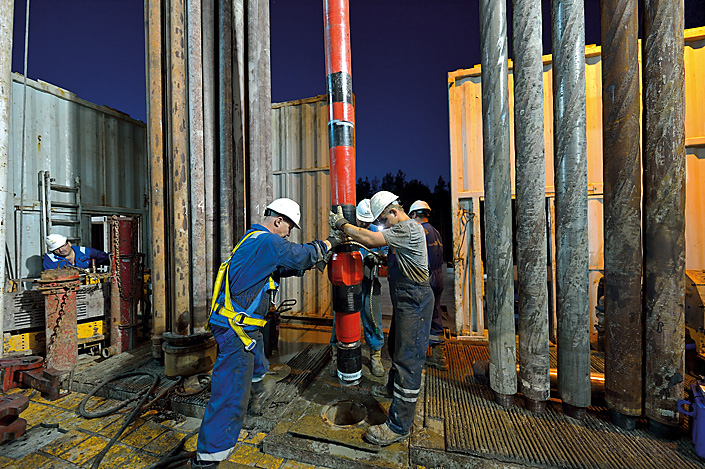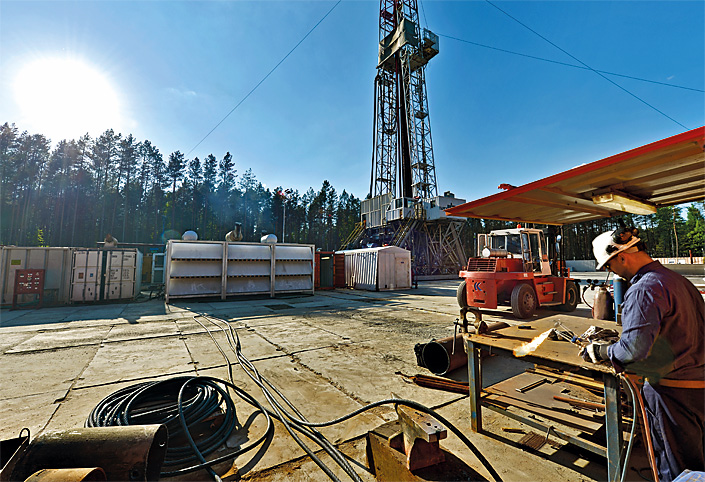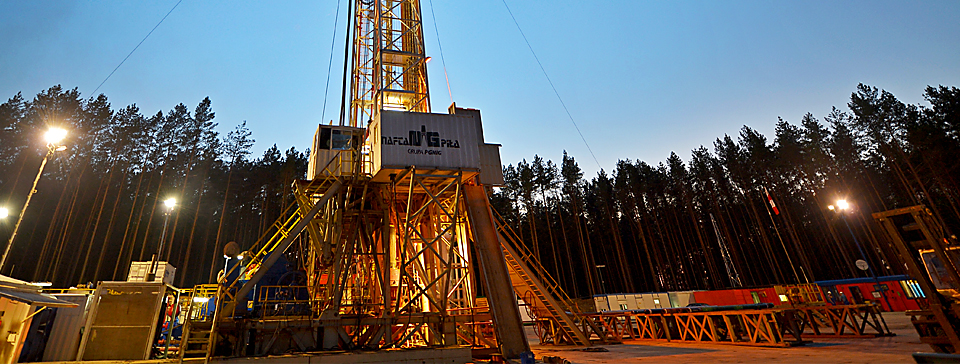Employees
Our employees are the Group’s most valuable asset – thanks to their experience we remain the market leader. Their commitment drives our growth, enhances the quality of our services, and enables us to gain new business capabilities.
The PGNiG Group is one of the largest employers in Poland. It employs individuals with extensive experience and high qualifications, but is also the first workplace for many young people. This kind of human capital is our most valuable asset, as it is thanks to our employees that we can provide our customers with the highest quality service, achieve success on the international arena and implement comprehensive investment programmes.
In 2012, the PGNiG Group’s headcount stood at 32,038 people. This represents a slight fall in employment of 745 from the Group’s 2011 headcount of 32,783 people.
Headcount as at the end of 2012, by segment (persons)
| 2012 | 2011 | 2010 | 2009 | |
|---|---|---|---|---|
| PGNiG Head Office | 617 | 838 | 840 | 833 |
| Exploration and Production | 10,990 | 12,054 | 11,592 | 10,800 |
| Trade and Storage | 3,780 | 3,841 | 3,809 | 3,836 |
| Distribution | 13,255 | 13,865 | 13,881 | 13,851 |
| Generation | 1,069 | – | – | – |
| Other activities | 2,327 | 2,185 | 2,296 | 2,073 |
| Total | 32,038 | 32,783 | 32,418 | 31,393 |
Development
Investment in human resources furthers PGNiG’s plans, while also supporting the individual ambitions of each employee. As the PGNiG Group’s subsidiaries are engaged in a wide range of businesses activities, it is up to each of them to determine the type and extent of their staff training.
A key role in the process of human resources development is played by the training management system. Our employees are offered opportunities for improving their professional qualifications by participating in training programmes, postgraduate studies, national trade conferences, seminars and symposia, and also through occupational training and self-education (e-learning).
Depending on their respective responsibilities and individual needs, employees may participate in various training courses on all aspects of modern business organisation, including project management, risk, legal environment analysis and customer service. Employee participation in training courses focusing on soft aspects of the organisation’s activity and management, such as communication, teamwork, team management and task management, is also an important element of the process.
Courses are also conducted on the acquisition and development of employees' practical skills, and reinforcement of skills in sales and management of sales teams. In this way, sales staff gain the knowledge and tools they need in their everyday work. These courses are targeted at several groups, including:
- Trade Departments’ managers – management standards for sales teams;
- Trade Departments’ employees – sales standards; the PGNiG sales track.
Development of our Exploration and Production activities will require all of the PGNiG employees’ skills in conducting talks and negotiations and in establishing long-term cooperation with various authorities and local communities. The training that we give our employees is designed to prepare them for this role.
It is extensive, and enables them to develop and enhance their professional qualifications, and the Company then benefits from the higher productivity of its personnel. Human resources development translates into higher value for the PGNiG Group, which is viewed positively by investors and customers; it also makes us a more desirable employer to prospective staff..
PGNiG Group – the Largest Employer
The PGNiG Group fulfils its obligations towards its employees and their families with the utmost diligence. These obligations are chiefly social and include:
- Organisation and co-financing of holidays for employees and their children, both in Poland and abroad,
- Financial assistance and material support for families in difficult financial and health situations,
- Subsidies for non-public healthcare services for employees and their family members,
- Repayable financial housing assistance,
- Organisation and co-financing of various forms of recreation (sports, leisure and cultural activities).
Internships
PGNiG also runs an internship programme, which is open to all who take part in the annual ‚Win an Internship’ contest and the ‚Energy Academy’ project. The paid internships offered by PGNiG are an attractive way of gaining professional experience and new skills and learning the specifics of work in the industry, and also offer a chance to gain employment with the PGNiG Group. The companies of the PGNiG Group also provide apprenticeships to students and graduates from across Poland.
Recruitment
The PGNiG Group apply best practices in recruitment, using the same methods employed by domestic and foreign companies with the highest standards of governance. Generally, we recruit by three means:
- Internal recruitment – involving the announcement of vacancies on the corporate intranet and in the newsletter, and subsequent selection of applications received;
- External recruitment – involving the announcement of vacancies on recruitment websites and at www.pgnig.pl, and subsequent selection of applications received;
- Direct search – this is the method applied to find individual candidates with specific qualifications, skills and experience.
As a general rule, any shortages are first supplemented through internal recruitment. Not only does this allow us to make full use of our employees’ potential, but it also motivates employees to work more efficiently and to seek out new experiences within the Group. External recruitment is conducted when people with particularly rare or specific competences not available in-house are sought, and is undertaken based on a detailed description of the competences, knowledge, skills and behaviour required for the post.

Team Integration
Integration and cooperation between PGNiG Group employees are essential elements in the productivity and quality of their work. The everyday work of the Group’s employees is supported by both traditional and electronic means of communication. As part of our communications initiatives, employees receive a daily electronic newsletter highlighting the most important developments in the PGNiG Group, as well as the “MaGAZyn”, a monthly internal bulletin devoted to key Group developments. We have also implemented a system based on “communicators” – persons responsible for disseminating information among employees across the Group. Additionally, an sms service is switched on several times a year. Employees receive text messages on their company phones, informing them of important business matters.
Another important part of our communications are the periodical virtual chats with the President of the Board, which take place 2 to 3 times a year. During these chats, employees can ask questions about any work-related issues.
The most up-to-date information is always available from our Intranet site, PGNiG Info, which provides users with all necessary data and services, wherever they are within the PGNiG network. Using our Corporate Intranet, employees can communicate with each other at different levels and access important information about their work. PGNiG’s Intranet also features an embedded web-based Instant Messaging service for the rapid exchange of information between employees – Lotus Sametime. Sametime’s IM feature allows users to communicate with each other, in real time, across the network. It facilitates group meetings, conference calls and simultaneous implementation of joint projects by teams located throughout the company. The Intranet also has its own search engine, which accelerates access to information and enables searching for files and documents stored on the corporate website, as well as browsing Internet websites. Most interestingly, employees can, according to their needs, make use of their own dedicated on-line tools to access their branch portals or the Lotus e-mail, view the company calendar, as well as access the Sametime platform. There is also a bulletin board, which can be used, for example, to display information on items that employees wish to buy, sell or exchange. The system of internal communications within the Group, including the Intranet, is undergoing constant improvement.
Code of Ethics. Appointment of the Ethics Officer
The initial work in this area was commenced several years ago. The values we have recognised as fundamental to the development of the Code of Ethical Conduct for PGNiG Employees include credibility, accountability, partnership and quality. These values, now integral to our Code, have always been cherished by our personnel as they form an integral part of the miners’ ethos, which has shaped our tradition and continues to be a valued part of PGNiG’s activities. Accordingly, implementation of the Ethics Programme Management System was a necessary step towards creating a sustainable and competitive company, ensuring market success and providing for the personal development and satisfaction of employees.
The appointment of the Ethics Officer and implementation of the Ethics Programme Management System at PGNiG were provided for in the Strategy of Sustainable Development and Responsible Business. Internal consultations were held with PGNiG management staff on the text of the Code of Ethics, as well as external consultations with academics, NGOs and public authorities. Their comments were taken into account during preparation of the final version of the Code of Ethics. A 24/7, dedicated “ethics hotline” was launched for PGNiG employees to ask questions or voice doubts about the rules of ethical conduct, and a direct email address was also made available. All this hard work finally resulted in the approved version of the PGNiG Code of Ethics, the PGNiG Ethics Programme Management System, the appointment of a PGNiG Ethics Officer at the Head Office, and appointment of an Ethics Committee composed of heads of departments of key concern to ethics (HR Management, the Sustainable Development and Responsible Business Officer etc). The Code of Ethics and the Ethics Programme Management System were then disseminated across the PGNiG Group.
Employment Optimisation
Since January 2009, the Group has operated the “Programme for Workforce Streamlining and Redundancy Payments to the Employees of the PGNiG Group for 2009–2011 (Stage 3)”, which has been extended until December 31st 2015. Its operation is based on the ‘stand-by’ principle, meaning that it may be implemented in extraordinary circumstances and requires all companies to follow a uniform procedure across the Group.
In 2012, the Programme was implemented at five companies of the PGNiG Group. At the PGNiG Head Office, PGNiG Technologie and ZRG Krosno, the Programme covered 139 former employees. The one-off redundancy payments to the terminated employees at the above companies were financed from PGNiG’s Central Restructuring Fund. Additionally, the Programme was launched at Mazowiecka Spółka Gazownictwa and Karpacka Spółka Gazownictwa, where the companies paid from their own funds to a total of 86 employees.
Also in 2012, in consultation with the trade unions, the Voluntary Termination Programme was launched. The purpose of the Programme was to reduce employment levels in a way least problematic for the employees. Therefore, as a socially responsible employer, a package with very favourable financial terms was prepared, well in excess of the requirements stipulated by the Labour Code. The Programme was aimed primarily at staff who were in the pre-retirement protection period on or before December 31st 2012. It was also open to other employees, and also on very attractive terms.
1,146 employees took advantage of the Voluntary Termination Programme, including:
- PGNiG – 855 persons,
- Mazowiecka Spółka Gazownictwa – 183 persons;
- Dolnośląska Spółka Gazownictwa – 108 persons.
Employee Satisfaction Surveys
In 2010, the first satisfaction survey was conducted among PGNiG employees. It was the first survey of its kind conducted among all PGNiG personnel. The key objective of the survey was to gauge the level of satisfaction among employees while identifying factors affecting that satisfaction; getting employees to define the strengths and weaknesses of PGNiG as an employer; identifying areas in need of improvement to raise employee satisfaction and loyalty; reviewing the values selected to be incorporated into the Code of Values, and identifying areas to be covered by the Code. The survey covered 10 areas: general attitude, remuneration, bonuses, awards, social benefits, working conditions, communication, management, work atmosphere, career and development, the Company’s image, and new solutions.
The survey’s results were gathered and published in a special edition of MaGAZyn, the corporate magazine, distributed among the Company’s employees. The average participation rate was 53% of all PGNiG employees, with the highest participation coming from the employees of the Gas Trading Divisions. In total, 60% of employees surveyed are satisfied with their jobs at PGNiG, only 6% of the respondents are not satisfied, and the remaining 34% offered neutral opinions. According to the PGNiG Management Board, attention to relationships within the organisation is at least as important as the Company’s external image. After all, employees are the key internal stakeholder group, whose commitment and satisfaction largely determine the Company’s success.
Sports Activities
Since its establishment in October 2003, Towarzystwo Sportowo-Turystyczne Nafty i Gazu “SportGas” (the SportGas Oil and Gas Association for Sport and Tourism) has been a well-organised, valid legal entity, whose primary objective is to design and promote initiatives, attitudes and activities conducive to active lifestyles and development of sports. The Association has eight sport sections, devoted to tennis, football, volleyball, badminton, shooting, bridge, fishing and running. A group of over 300 members of the Association, mainly employees of the PGNiG Group and other gas industry companies, pursue their passion for sports in various forms of competition, both within the PGNiG Group and outside it, participating in business leagues and cross-industry tournaments.
Performance Assessment
In 2011 we launched the PGNiG Performance Evaluation System. The system was developed as part of a broader initiative, designated the “Implementation of the New Group Management Model” under the “PGNiG Group’s Value Based Management (VBM) Programme for 2009–2015.” In order to better adjust the Performance Assessment System to the dynamic market situation, in 2012 the system was modified. Adjustments were made to both the principles of assessment and the software application supporting the assessment process, to more effectively support the management in achieving strategic objectives. Assessment of the work of every Company employee is conducted on a quarterly basis, following uniform criteria across all Branches. As part of the assessment, particular emphasis is placed on individual targets assigned to employees, which are linked to the strategic objectives of the organisation. During the assessment process, managers meet with employees to discusses their goals and their managers’ expectations of them and identify the areas they should work on, with the support of a supervisor. This type of assessment process allows employees to discuss the needs and challenges of their positions, and is a source of feedback on both their achievements and potential issues in their professional development. Key features of the system implemented at PGNiG are the clarity and transparency of its criteria, its simplicity and universality, and the cyclical nature of the assessment process.
PGNiG’s Performance Assessment System also complements its Management By Objectives (MBO) programme, designed for TOP management. Comprehensive assessment of the implementation of strategic objectives also provides the basis for evaluation and remuneration of employees implementing the strategic objectives. The System is designed to strengthen employees’ sense of responsibility for the PGNiG Group’s performance.

Workplace safety
The employer who consciously invests in Occupational Health and Safety knows that taking these actions not only prevents accidents, occupational diseases and major industrial incidents, but also builds a positive image of the company – which in turn has a significant influence on its success.
The employer has a duty to protect the life and health of its employees, using the latest scientific and technological achievements, including those in ergonomics, sociology, psychology, occupational health and good practice.
The problem of occupational health and safety is not only a humanitarian issue, but also an economic one. In the course of their work, employees are exposed to risks arising not only from the work itself, but also from the environment in which they operate. Consequently, more favourable working conditions create the perception among employees that the work is less arduous, thus enhancing their productivity.
Most important, however, is to determine the seriousness of threats to health and safety in the workplace and whether they are being adequately dealt with. The tool for doing this is a workplace risk assessment. On the basis of this assessment, both protective and preventive measures are taken, such as group and personal protection, modernisation of plant and equipment, renovation and modernisation of premises, specialist training, prophylactic health examinations, implementation of occupational health and safety management systems, and development of instructions and procedures, all in order to eliminate or mitigate risks.
In terms of economics, OHS solutions implemented following a risk assessment have a positive effect on productivity, output, insurance premiums, costs of workplace accidents etc.
Furthermore, OHS activities are not only the subject of basic internal regulations, but also of specific laws, such as geological and mining law, construction law and the law on mine rescue operations, as well as legislation on fire safety and environmental protection, etc. Knowledge of these laws can ensure optimum working conditions and their continuous improvement.
All the above-mentioned elements are, under law, reflected in the OHS policy work carried out at the PGNiG Group, by both the Management Board and the individual employees.
In addition, in order to meet the highest international standards for winning new contracts and business partners and improve the Company’s ties with foreign companies, in December 2011 the Management Board of PGNiG SA implemented, through the adoption of its Health, Safety and Environment (HSE) Policy, the HSE Operator System. The HSE system serves to safeguard the health of workers, ensure safe working conditions, and protect the environment. Although there is no legal obligation to implement the HSE System, PGNiG has done so voluntarily, beyond its obligations and duties. For PGNiG, ensuring the highest level of safety of their employees, local communities and the environment, by conducting their operations in a safe manner and minimising risk at every step, is of the highest importance. The HSE system we have implemented is based on the best practices of the oil sector, and follows the guidelines laid down by the OGP (International Association of Oil & Gas Producers) and the E&P Forum (Exploration & Production Forum). The main objective of our new HSE Operator System is to build a culture of safety and awareness amongst our employees.






